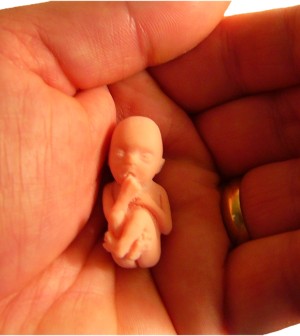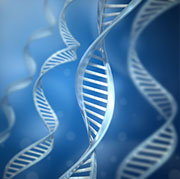- Double Mastectomy May Offer No Survival Benefit to Women With Breast Cancer
- Toxic Lead Found in Cinnamon Product, FDA Says
- Certain Abbott Blood Sugar Monitors May Give Incorrect Readings
- Athletes Can Expect High Ozone, Pollen Counts for Paris Olympics
- Fake Oxycontin Pills Widespread and Potentially Deadly: Report
- Shingles Vaccine Could Lower Dementia Risk
- Your Odds for Accidental Gun Death Rise Greatly in Certain States
- Kids From Poorer Families Less Likely to Survive Cancer
- Tough Workouts Won’t Trigger Cardiac Arrest in Folks With Long QT Syndrome
- At-Home Colon Cancer Test Can Save Lives
Embryo Selection May Help Prevent Some Inherited Disorders


When a 27-year-old woman wanted to have a baby using in vitro fertilization, there was one major problem — she was a carrier of Gerstmann-Straussler-Sheinker syndrome.
This rare, degenerative neurological condition is usually diagnosed in mid-life and is always fatal. Not wanting to risk having her child become a victim of the syndrome, she turned to a technique that tests embryos for certain mutated genes and only uses those embryos that don’t carry the mutation for implantation.
“This disease was found in five generations in this family, and we stopped passing these bad genes to the next generation,” said study co-author Svetlana Rechitsky, laboratory director at the Reproductive Genetics Institute in Chicago.
According to Dr. Ilan Tur-Kaspa, lead researcher and president and medical director of the Institute for Human Reproduction in Chicago, “These new cases can be prevented now by pre-implantation genetic diagnosis.” Although this is the first report on using this method for a so-called prion disorder, it could also help prevent diseases like Huntington’s and familial forms of Alzheimer’s disease, he said.
Prion diseases involve abnormal foldings of the prion protein in the brain. The most commonly known one, which is not inherited, is bovine spongiform encephalopathy, or “mad cow” disease.
The report was published online Feb. 3 in the journal JAMA Neurology.
The process started with a simple in vitro fertilization procedure. Eggs from the woman were removed and fertilized. Then came the tricky part.
Doctors removed single cells from the embryos, and because the syndrome is caused by a single gene mutation, they looked at DNA to find embryos that didn’t have the mutated gene.
“We can identify which embryo is healthy, and which embryo has the bad gene,” Rechitsky explained.
Two of the disease-free embryos were implanted, and the woman had twins delivered by cesarean section a little more than 33 weeks later. The remaining normal embryos were frozen for later use.
At 27 months, the twins had normal communication, social and emotional skills, the researchers reported.
One expert noted the importance of the finding.
“Most of the genetic disorders identified by pre-implantation genetic diagnosis are caused by either single genes — such as cystic fibrosis, Huntington’s disease, sickle cell anemia, Down syndrome, Trisomy 18 [Edwards syndrome] and chromosomal translocations — and most have no treatment or cure,” said Christine Metz, director of Maternal-Fetal Medicine Research at the Feinstein Institute for Medical Research in Manhasset, N.Y. “Thus, it is important for young parents to know and understand their risks for inherited diseases prior to conception.”
In addition, pre-implantation genetic diagnosis is beginning to be used to reduce the transmission of mutant cancer genes, such as the BRCA1/BRCA2 genes, which are tied to breast cancer, and the MLH1, MSH2 and APC genes that are linked to colon cancer, she said.
“Over several generations, we can hope to improve human health by reducing the transmission of several hereditary disorders,” Metz said.
Rechitsky acknowledged that some people have ethical problems with the potential for this technology to be used to tailor babies to parents’ desires. However, in the 25 years they have been doing the procedure it hasn’t been a problem, she said.
“We had the first successful pregnancy in 1990,” Rechitsky said. “Over the years, we have performed over 4,000 procedures for single-gene disorders. It has become a more widely accepted approach to prevent hereditary disease,” she explained.
As to tailoring babies, “we have never ever had any requests like this,” she said. Moreover, many of the things parents might want to select for like intelligence, involve many genes, not just one. “We don’t know even how to approach this,” she noted.
Dr. Avner Hershlag, chief of the Center for Human Reproduction at North Shore University Hospital in Manhasset, N.Y., said, “Like any sophisticated technique, reproductive technology can be abused. There are ethical issues.”
Hershlag said that “the most ethical approach is that it should be used for identifying disease only, and for selecting embryos that are free of disease. I don’t want it to ever head into that murky, questionable line between what is right and what is wrong. It is absolutely right to diagnose a disease in an embryo and to use embryos that don’t have disease.”
More information
Visit the American Pregnancy Association for more on pre-implantation genetic diagnosis.
Source: HealthDay
Copyright © 2024 HealthDay. All rights reserved.










